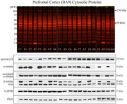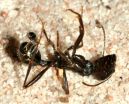(Press-News.org) Fighting off illness- rather than the illness itself- causes sleep deprivation and affects memory, a new study has found.
University of Leicester biologist Dr Eamonn Mallon said a common perception is that if you are sick, you sleep more.
But the study, carried out in flies, found that sickness induced insomnia is quite common.
The research has been published in the journal PeerJ at: http://peerj.com/articles/434
Dr Mallon said: "Think about when you are sick. Your sleep is disturbed and you're generally not feeling at your sharpest. Previously work has been carried out showing that being infected leads to exactly these behaviours in fruit flies.
"In this paper we show that it can be the immune system itself that can cause these problems. By turning on the immune system in flies artificially (with no infection present) we reduced how long they slept and how well they performed in a memory test.
"This is an interesting result as these connections between the brain and the immune system have come to the fore recently in medicine. It seems to be because the two systems speak the same chemical language and often cross-talk. Having a model of this in the fly, one of the main systems used in genetic research will be a boost to the field.
"The key message of this study is that the immune response, sleep and memory seem to be intimately linked. Medicine is beginning to study these links between the brain and the immune system in humans. Having an easy to use insect model would be very helpful."
INFORMATION:
Funded by the Biotechnology and Biological Sciences Research Council (BBSRC), Dr Mallon carried out the study with Ezio Rosato (Genetics), Robert Holdbrook (Biology undergraduate) and Akram Alghamdi (Taif University, Saudi Arabia while a PhD student at Leicester).
Immune response affects sleep and memory -- new study
Sickness-induced insomnia is common because of link between brain and immune system
2014-06-12
ELSE PRESS RELEASES FROM THIS DATE:
Twelve minutes of exercise improves attention, reading comprehension in low-income adolescents
2014-06-12
HANOVER, N.H. – June 12, 2014 – A new Dartmouth study shows 12 minutes of exercise can improve attention and reading comprehension in low-income adolescents, suggesting that schools serving low-income populations should work brief bouts of exercise into their daily schedules.
The study, published as part of the June volume of Frontiers in Psychology, compared low-income adolescents with their high-income peers. While both groups saw improvement in selective visual attention up to 45 minutes after exercising, the low-income group experienced a bigger jump. (Selective visual ...
Potential new treatment may protect celiac patients from gluten-induced injury
2014-06-12
Bethesda, MD (June 12, 2014) — The gluten-specific enzyme ALV003 reduces a patient's exposure to gluten and its potential harm, according to a new phase 2 study appearing in Gastroenterology1, the official journal of the American Gastroenterological Association. This study is the first to find that a non-dietary intervention can potentially benefit celiac disease patients.
Study participants were put on an everyday gluten-free diet, challenged with up to 2 grams of gluten daily (equivalent to approximately one half of a standard slice of bread in the U.S.). Researchers ...
First articles published in new Journal of Medical Imaging
2014-06-12
BELLINGHAM, Washington (USA) — The Journal of Medical Imaging (JMI) has launched, with freely accessible articles on new research on earlier and more accurate diagnosis and monitoring of cancer and other diseases, image quality assessment, 3D imaging, and other topics. Published by SPIE, the international society for optics and photonics, the quarterly journal is available online in the SPIE Digital Library, with each peer-reviewed article published as it is approved. JMI will also be issued in print.
JMI covers fundamental and translational research and applications ...
Climate change winners and losers
2014-06-12
The Antarctic Peninsula, the northern most region of Antarctica, is experiencing some of the most dramatic changes due to climate warming, including population declines of some penguin species.
This is not the first time that region has felt the effects of climate warming. How did penguins respond to the melting of snow and ice cover 11,000 years ago at the end of the last Ice Age?
Today, scientists have traced the genetics of modern penguin populations back to their early ancestors from the last Ice Age to better understand how three Antarctic penguin species – gentoo, ...
Rise and fall of prehistoric penguin populations charted
2014-06-12
A study of how penguin populations have changed over the last 30,000 years has shown that between the last ice age and up to around 1,000 years ago penguin populations benefitted from climate warming and retreating ice. This suggests that recent declines in penguins may be because ice is now retreating too far or too fast.
An international team, led by scientists from the Universities of Southampton and Oxford, has used a genetic technique to estimate when current genetic diversity arose in penguins and to recreate past population sizes. Looking at the 30,000 years before ...
A picture's worth a thousand words
2014-06-12
For nearly 100 years, we have known that type 1 diabetes (T1D) is a disease fundamentally about the progressive loss of insulin-producing beta cells, but measuring that loss has continued to elude researchers—at least until now.
In a recent scientific publication, JDRF-funded researchers used a radiotracer or marker and PET (Positron Emission Tomography) scanning as a non-invasive technique to follow changes in how many active beta cells a person has. Dr. Olle Korsgren and his colleagues at the University of Uppsala in Sweden used the technique in a clinical study ...
Alcohol abuse damage in neurones at a molecular scale identified for first time
2014-06-12
This news release is available in Spanish.
Joint research between the University of the Basque Country (UPV/EHU) and the University of Nottingham has identified, for the first time, the structural damage caused at a molecular level to the brain by the chronic excessive abuse of alcohol. In concrete, the research team has determined the alterations produced in the neurones of the prefrontal zone of the brain (the most advanced zone in terms of evolution and that which controls executive functions such as planning, designing strategies, working memory, selective ...
David and Goliath: How a tiny spider catches much larger prey
2014-06-12
In nature, it is very rare to find a proverbial much smaller David able to overpower and kill a Goliath for supper. This is exactly the modus operandi of a solitary tiny spider from the Negev desert in Israel that routinely kills ants up to almost four times its own size. Details about how it attacks and kills its prey with a venomous bite is published in Springer's journal Naturwissenschaften – The Science of Nature. The study was led by Stano Pekár of Masaryk University in the Czech Republic.
Pekár's team observed the natural prey and predatory behavior of the minute ...
Survivors of childhood liver transplant at risk of becoming 'skinny fat'
2014-06-12
New research reports that survivors of childhood liver transplant remain nutritionally compromised over the long-term. Findings published in Liver Transplantation, a journal of the American Association for the Study of Liver Diseases and the International Liver Transplantation Society, indicate that the recipients' return to normal weight post-transplant was due to an increase in fat mass as body cell mass remained low, indicating a slim body composition with little lean muscle mass or "skinny fat."
Children with end-stage liver disease may be malnourished due to inadequate ...
Scientists closing in on new obesity drug
2014-06-12
Obesity and diabetes are among the fastest growing health problems in the world, and the hunt is in for a pill that can fight the problem. Now a Danish/British team has come up with a smart tool that will speed up the scientific hunting process, and we may be one step closer to a pill against obesity.
The body has a variety of functions that decide if we get overweight or not. For instance hormones control our appetite and the uptake of food. In recent years science has taken on the quest of investigating these physiological functions and finding a medical way to fight ...
LAST 30 PRESS RELEASES:
Machine learning tool can predict serious transplant complications months earlier
Prevalence of over-the-counter and prescription medication use in the US
US child mental health care need, unmet needs, and difficulty accessing services
Incidental rotator cuff abnormalities on magnetic resonance imaging
Sensing local fibers in pancreatic tumors, cancer cells ‘choose’ to either grow or tolerate treatment
Barriers to mental health care leave many children behind, new data cautions
Cancer and inflammation: immunologic interplay, translational advances, and clinical strategies
Bioactive polyphenolic compounds and in vitro anti-degenerative property-based pharmacological propensities of some promising germplasms of Amaranthus hypochondriacus L.
AI-powered companionship: PolyU interfaculty scholar harnesses music and empathetic speech in robots to combat loneliness
Antarctica sits above Earth’s strongest “gravity hole.” Now we know how it got that way
Haircare products made with botanicals protects strands, adds shine
Enhanced pulmonary nodule detection and classification using artificial intelligence on LIDC-IDRI data
Using NBA, study finds that pay differences among top performers can erode cooperation
Korea University, Stanford University, and IESGA launch Water Sustainability Index to combat ESG greenwashing
Molecular glue discovery: large scale instead of lucky strike
Insulin resistance predictor highlights cancer connection
Explaining next-generation solar cells
Slippery ions create a smoother path to blue energy
Magnetic resonance imaging opens the door to better treatments for underdiagnosed atypical Parkinsonisms
National poll finds gaps in community preparedness for teen cardiac emergencies
One strategy to block both drug-resistant bacteria and influenza: new broad-spectrum infection prevention approach validated
Survey: 3 in 4 skip physical therapy homework, stunting progress
College students who spend hours on social media are more likely to be lonely – national US study
Evidence behind intermittent fasting for weight loss fails to match hype
How AI tools like DeepSeek are transforming emotional and mental health care of Chinese youth
Study finds link between sugary drinks and anxiety in young people
Scientists show how to predict world’s deadly scorpion hotspots
ASU researchers to lead AAAS panel on water insecurity in the United States
ASU professor Anne Stone to present at AAAS Conference in Phoenix on ancient origins of modern disease
Proposals for exploring viruses and skin as the next experimental quantum frontiers share US$30,000 science award
[Press-News.org] Immune response affects sleep and memory -- new studySickness-induced insomnia is common because of link between brain and immune system




